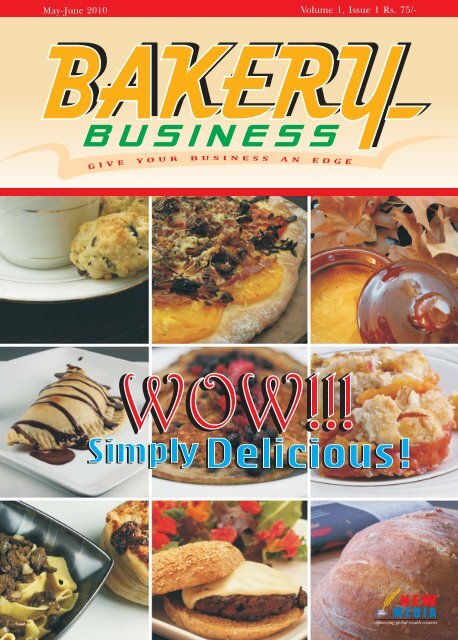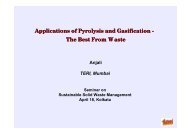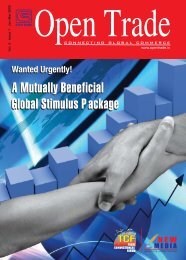business - new media
business - new media
business - new media
Create successful ePaper yourself
Turn your PDF publications into a flip-book with our unique Google optimized e-Paper software.
May-June 2010 Volume 1, Issue 1 Rs. 75/-<br />
BUSINESS<br />
Simply Delicious!<br />
connecting global wealth creators
C ONTENT<br />
INSIDE<br />
Indian Bakery Business<br />
Founder Chairman<br />
Late Shri R.K. Prasad<br />
STUDY<br />
OVERVIEW<br />
Sensient Dairyboost<br />
Flavours<br />
PROFILE<br />
Published by:<br />
New Media Communication Pvt. Ltd.<br />
Managing Editor: Satya Swaroop<br />
Director: B.K. Sinha<br />
Editor: Nicholas Kharkongor<br />
Contributing Editors: Uday Tarra Nayar<br />
Consulting Editors: Prabhuu Sinha,<br />
Tripat Oberoi & Md. Sabir Nishat<br />
Marketing Manager: Samir Sehgal<br />
Sales: Nitin Sharma, Arti Suvarna<br />
Strategic Advisor: Vinaya Shetty<br />
Manager- Admin & Finance: Sunil Kumar<br />
Liaison Officer: Vrunda Gurav<br />
Executive Database: Madhavi Singh<br />
Circulation: Jawaharlal, Santosh Gangurde,<br />
Vijay Wangade<br />
Art Director: Santosh Nawar<br />
Visualizers: Sagar Banawalikar<br />
Photographer: Bilal Ahmed Khan<br />
BRANCHES:<br />
Kolkata:<br />
Anurag Sinha, Regional Head,<br />
Mob: 098300 15667<br />
Email:anurag@<strong>new</strong><strong>media</strong>comm.biz<br />
Bakery Industry: Past, Present and Future<br />
PROFILE<br />
Milk based<br />
proteins- the<br />
way to Eggless Success!<br />
GUIDELINES<br />
Essentials for Food<br />
Safety Certificate<br />
in Bakery Industry<br />
Pune:<br />
Jagdish Khaladkar, Regional Director,<br />
Mobile: 098230 38315<br />
Email: pune@<strong>new</strong><strong>media</strong>comm.biz<br />
Australia Office:<br />
Bandhana Kumari Prasad, 129 Camboon Road,<br />
Noranda, Perth, W.A. 6062 Tel: 0061 892757447<br />
Email: bandhana@<strong>new</strong><strong>media</strong>comm.biz<br />
New Media Communication Pvt. Ltd.,<br />
New Media House, 1 Akbar Villa,<br />
Near Old State Bank, Moral-Maroshi Road,<br />
Andheri (E), Mumbai - 400 059<br />
Tel: +91-22-2925 0690. Telefax: +91-22-2925 5279<br />
E-mail: enquiry@<strong>new</strong><strong>media</strong>comm.biz<br />
www.<strong>new</strong><strong>media</strong>comm.com<br />
The <strong>new</strong>s items and information published herein have<br />
been collected from various sources, which are considered<br />
to be reliable. Readers are however requested to verify the<br />
facts before making <strong>business</strong> decisions using the same.<br />
04<br />
Bakery Business May-June 2010
E DITORIAL<br />
Dear Reader,<br />
Greetings. For all of you in the <strong>business</strong> of making life sweeter for the world's<br />
food lovers, we have brought out the inaugural issue of Bakery Business!<br />
Baking is one of the oldest methods of cooking. Man's search for good food<br />
has always led him to discover <strong>new</strong>, improved ways of cooking. As a result,<br />
baking has gone through its own gamut of improvements and innovations.<br />
The <strong>business</strong> of confectionery has made impressive progress with the<br />
development of technology and easier methods to produce anything the<br />
consumer wants on a mass scale.<br />
Did you know that the Indian biscuits industry is the second largest in the<br />
world after America's Or that it is the biggest from amongst all the food<br />
industries, with a turnover of 3,000 crores annually In this inaugural issue,<br />
we simply had to have a report on this industry that is doing so well! There is<br />
also a report on the bakery <strong>business</strong> in general, with a special focus on the<br />
use of enzymes in the bakery process [a trend we are likely to see more of in<br />
the future].<br />
In 2008, in Georgia, USA, a factory of Imperial Sugar went up in flames<br />
because of excess sugar dust that heated up and caught fire. An enquiry was<br />
launched, and the report came out recently. The findings, listed in this issue,<br />
serve as a cautionary tale in the prevention of sugar and dust fires in the<br />
bakery industry.<br />
Dr. Meena Mehta, who lectures on Food Science and Nutrition, takes us<br />
through the history of the bakery industry and lists specific areas of bakery<br />
where future breakthroughs in research will lead to better baked products for<br />
us all. Food consultant Subhash Vaidya gives us a comprehensive list of the<br />
requirements that need to be in place in a bakery in order to get a food safety<br />
certificate.<br />
New Media recently organized a conference on Modern Bakery Practices<br />
where the leading minds of the <strong>business</strong> got together, exchanged ideas and<br />
debated on issues. It was an exciting event, and we have a photo story of it.<br />
Bakery Business hopes to be your connect with your fraternity, a platform for<br />
exchange of information and your window to developments around the<br />
world. We promise to give you our best in the months and years ahead!<br />
As for this inuagural issue of Bakery Business, we can only wish you<br />
Happy Reading!<br />
Satya Swaroop<br />
Managing Editor<br />
satya@<strong>new</strong><strong>media</strong>comm.biz<br />
05<br />
Bakery Business May-June 2010
S TUDY<br />
Indian Bakery Business<br />
Since 2004, the Indian bakery industry has been<br />
taking huge strides forward, undergoing a virtual<br />
metamorphosis thanks to increasing consumer<br />
gravitation toward convenience products and<br />
health food products. The market is expected to<br />
grow at a steady rate of 8 per cent from 2010<br />
onwards. At present, the bakery market in the<br />
country is valued at Rs 3,295 crore.<br />
In a recent analysis report “Trend analysis of<br />
ingredients applications in Indian bakery Industry,”<br />
Frost & Sullivan stated that the Indian bakery market<br />
earned revenues of over $161.4 million in 2007<br />
and estimates this to reach $278.1 million in 2014.<br />
According to reports, the annual production of<br />
bakery products which includes bread, biscuits,<br />
pastries, cakes, buns and rusk most of which are in<br />
the unorganised sector, is estimated to be in excess<br />
of 3 million tonnes.<br />
The production of bread and biscuits in the country<br />
both in the organised and unorganised sectors is<br />
estimated to be over 2 million tonnes and 1.5<br />
million tonnes respectively. Of the total production<br />
of bread and biscuits, only 35 per cent is produced<br />
in the organised sector and the remaining is<br />
manufactured in the unorganised sector.<br />
Frost & Sullivan is one of the leading <strong>business</strong><br />
research & consulting firm which offers market<br />
analysis, market research, and reports. B<br />
Maheshwari, senior consulting analyst for Frost &<br />
Sullivan, said, “The food industry is riding on a<br />
health wave; an increase in consumer awareness<br />
about health concerns has led to most of the bakery<br />
products being augmented with health benefits<br />
from fiber and whole grains.”<br />
However in bakery ingredients industry, the addition<br />
of whole wheat and fibres disrupts the gluten<br />
network, which could lead to processing difficulties,<br />
changing organoleptic properties and causing<br />
quality problems. Using enzymes offers a way out.<br />
Enzymes interact with the gluten network,<br />
strengthening and stabilising the dough during<br />
processing, baking, and proofing. The escalating<br />
demand for whole grain and high-fibre bakery<br />
products will thus positively impact market<br />
progression in the bakery enzyme sector as well, the<br />
research firm said.<br />
“On one hand, severe competition in this space<br />
prevents manufacturers from hiking prices. Norms<br />
set by the government for products such as bread<br />
have increased the bargaining power of end users,<br />
reining in revenues in the bakery ingredients<br />
market,” Maheshwari added.<br />
“Although local manufacturers have an advantage<br />
in many ingredient markets, the threat from imports<br />
looms large. The Indian market is devoid of entry<br />
barriers for imports, and specialty ingredients<br />
manufactured abroad are multifunctional and are<br />
higher in quality compared with domestic products.<br />
Further, soaring inflation rates in India and rising<br />
manufacturing costs are eating into profits,” the<br />
analysis report stated.<br />
According to All India Bread Manufacturers<br />
Association (Aibma), per capita consumption of<br />
bread across India is only about 1.75 kg.<br />
“Meticulous analysis of regional consumption of<br />
bread denotes, Southern states top with 32 per<br />
cent, Northern, Western, and Eastern states<br />
consume around 27 per cent, 23 per cent, 18 per<br />
cent respectively.<br />
“Rapidly growing population and mounting middle<br />
class income are the significant drivers for the wide<br />
expansion of the quality bakery ingredients &<br />
products industry, so it is not uphill task to make<br />
substantial profits out of country's bakery market, if<br />
managed properly and sensibly,” Aibma said.<br />
Further the Frost & Sullivan report suggests that the<br />
Indian manufacturers can opt for energy-saving<br />
projects to keep manufacturing costs in check.<br />
Innovation offers another route to higher margins<br />
for ingredient manufacturers.<br />
<br />
06<br />
Bakery Business May-June 2010
For Indian sweets made from mawa<br />
& cashewnuts, Rasgullas & Cookies<br />
(Centre-filled, wire-cut & ice-box<br />
cookies)<br />
Precision sheeting of various pastry sheets from table top sheeters, Manomat,<br />
Automat, Ecomat, Kondustar, fully computerised dough sheeters & production lines<br />
for 4 / 5 / 6 pocket Buns / Roll<br />
lines including Automatic<br />
Panning Systems<br />
Apple Bakery Machinery Pvt Ltd<br />
st<br />
20i 1 Floor,Hansraj Damodar Wadi, off Kennedy Bridge, Opera House Mumbai 400004<br />
Tele/fax: (022) 23852629 /23852631/32/33 Office mobile no.: 00 91 9324408411<br />
Website: www.applebakerymachinery.in Email: info@applebakerymachinery.in
P RODUCTPROFILE<br />
Applet Bakery Machinery<br />
The <strong>new</strong> CORNUCOPIA® KN170 was<br />
designed to specialize in confectionery. It is<br />
also being used by Indian Sweet<br />
Manufacturers to make sweets like multi-color<br />
peda's and snack items like kachori's.<br />
Jaydeo Chokhawala<br />
Recently 2-color Icebox and filled cookies options were introduced. These<br />
products are a novelty and have a huge potential to do well. So far, they<br />
have been very well received in the Indian market.<br />
Product Weight, Filling/Dough Ratio and Length are Flexible.<br />
Weight Range<br />
(10~90g)<br />
Length Range Encrusting ratio Range Design variation Dough dividing<br />
Cylindrical molding<br />
Spherical molding<br />
with filling<br />
Cylindrical<br />
co-extrusion<br />
in mosaic pattern<br />
Bar shape molding<br />
with filling<br />
Cylindrical<br />
co-extrusion<br />
in spiral pattern<br />
Lian Huat Continuous Bun Divider & Rounder<br />
Lian Huat is a 55-year-old Malaysian company that<br />
specializes in bread-making machines. They are one of the<br />
leaders of stress-free dough systems that make superior<br />
quality bread with a longer shelf life.<br />
Macadams Modular Deck Ovens<br />
Macadams Baking Systems of South Africa is an ISO 9001<br />
company. It is one of the largest manufacturers of bakery<br />
equipment in the world. With state of the art software<br />
packages and improved components, Macadams have<br />
engineered an oven that is extremely high on quality and<br />
efficiency.<br />
08<br />
Bakery Business May-June 2010
P RODUCTPROFILE<br />
Rondo Doge Sheeters<br />
Rondo Doge is a Swiss company, one of the largest manufacturers of sheeters and has a very wide range of<br />
dough sheeters.<br />
With more than 50 years of pioneering solutions for dough processing, Rondo Doge machines and services<br />
are trusted by professionals world-wide to help them produce high quality products in an effective and<br />
economical way.<br />
Rondo Doge is best known for its broad range of machines and lines for sheeting and laminating, for<br />
production of pastry, khari, rolls, croissants, and many more like thin dough, donuts and special products.<br />
Sinmag SV series Rack Ovens<br />
Sinmag has introduced the SV<br />
series of Rack Ovens, which<br />
are based on Swedish<br />
Technology.<br />
These are superior ovens with<br />
the lowest fuel consumption<br />
and the best baking<br />
results.They are very<br />
economically priced.<br />
Brickman Oven Gloves<br />
Apple Introduces Brickman Oven Gloves from Italy for the first<br />
time in India. These are high quality oven gloves which protect<br />
from 300° - 500° C.<br />
09<br />
Bakery Business May-June 2010
P ROFILE<br />
Sensient Dairyboost<br />
Sensient DairyBoost Natural Cheese Flavours DairyBoost Cheese flavours are a healthy choice<br />
enliven taste perception in processed foods and are too, as at typical application levels, they contribute<br />
designed to replicate and enhance the taste of real less than 0.15% fat. They are easy to use in<br />
cheese while also contributing complex mouth powdered form, fluctuate less in price based on a<br />
filling and natural enhancement characteristics cost-in-use basis, and provide an exceptional range<br />
without adding Mono sodium glutamate or of advantages that meet <strong>new</strong> product<br />
ribotide. It further adds to vitality and depth of developers exacting needs, besides<br />
character.<br />
replacing part of cheese powder.<br />
The Dairyboost Cheese portfolio represents the<br />
world's most popular cheese styles, such as<br />
Cheddar, Vintage Cheddar, Processed Cheddar,<br />
Parmesan, Romano, Creamy, Blue, Swiss, Feta, and<br />
Ricotta.<br />
The development uses proprietary<br />
technology, time temperature processing<br />
and natural enhancement technology<br />
to liberate intense and vibrant<br />
flavours that deliver upto 15 times the<br />
flavour strength of standard cheese<br />
ingredients and are used at extremely<br />
low application levels.<br />
Flavours<br />
These offer advantages in usage in<br />
multiple formulations such as Sauces and<br />
dressing, Dairy products, Savoury products<br />
(snack seasonings), bakery products and<br />
Chilled Desserts.<br />
Apart from Cheese flavours, Sensient<br />
specialities include DairyBoost Butter and<br />
Cream flavours that contribute greater flavour<br />
to foods and beverages, increasing consumer<br />
acceptance.<br />
The fresh cream or butterfat goes through a<br />
complex proprietary process, eventually<br />
producing a rich texture that gives the sensation<br />
of butter fat on the palate.<br />
<br />
10<br />
Bakery Business May-June 2010
O VERVIEW<br />
Bakery Industry: Past,<br />
Present And Future<br />
Dr. Meena Mehta, Department of Food Science & Nutrition,<br />
Dr. B.M. Nanavati College of Home Science<br />
In the food and beverage sector, the bakery industry<br />
has a central role to play. Whether it's in the morning<br />
or the evening, we are always consuming bakery<br />
products, especially biscuits and bread. In<br />
Maharastra, bread-based vadapav and pavbhaji<br />
are fast foods liked by every age group of<br />
consumers. Thus bakery products have become an<br />
integral part of every type of meal.<br />
The first good primitive baking uses were perhaps<br />
done in Egypt around 2600BC. After that it<br />
remained a neglected field. In the 8th century BC,<br />
Roman bakers started to use, for the first time, a<br />
mechanical means of mixing dough. By the end of<br />
the 2nd century AD, the Roman bakers had<br />
organized themselves into a professional group. In<br />
India bread received attention during the British Raj.<br />
Baking is an art which anyone can master with<br />
patience and practice. However, baking blindly is<br />
injustice to this art because baking requires not only<br />
a wealth of technical knowledge and skill but also<br />
specialized equipment. The growth of the food<br />
industry from a<br />
kitchen craft to<br />
the present state<br />
of hi-technology<br />
is a fascinating story. In earlier times, bakers faced<br />
many difficulties, particularly because of the ever<br />
increasing price of raw materials and its labor<br />
intensive nature.<br />
Today bakery and confectionery products form a<br />
major segment of the food processing industry. The<br />
turnover of the bakery industry in the year 2005 was<br />
about 15,000 crore rupees which is expected to<br />
increase by ten fold in the near future. Bakery<br />
products like bread, biscuits and pizza have<br />
become popular in India. It is evident that these<br />
products are consumed by everybody. It is no more<br />
limited to the higher income group people.<br />
“Give us our daily bread” is an eternal prayer said<br />
by people allover the world everyday. It just goes to<br />
prove that bread is the stuff of daily life and a staple<br />
diet for each and everyone.<br />
12<br />
Bakery Business May-June 2010
O VERVIEW<br />
Among all the bakery products, bread and<br />
biscuits have become the most popular foods<br />
because of the following reasons:<br />
micronutrients.<br />
5. Formulation of frozen batter for quick bread-<br />
making.<br />
6. Pre-baked items using appropriate packaging<br />
materials and authentic permissible food<br />
preservatives.<br />
7. Pour it in prepared tin and bake for 30-40<br />
minutes at 1500C to make the product fast and<br />
quick to serve.<br />
8. Use of slow flame on gas to minimize the cost of<br />
fuel used in making the bakery products..<br />
9. Pie with fruit fillings and inclusions of tortillas and<br />
its varieties.<br />
10. Developments of <strong>new</strong> nutritious breads and<br />
biscuits.<br />
1. The mild pleasant aroma appeals to all age<br />
groups.<br />
2. Urbanization and long hours at work leave little<br />
time for active kitchen work, hence a rise in<br />
demand of bread-based 'ready to eat' foods.<br />
3. Progressive changes in ethnic foods have also<br />
made it more bread-based.<br />
4. It holds an advantage for the old age group for<br />
its properties like easy mastication.<br />
5. Bread versatility is a great attribute it possesses. It<br />
can be consumed along with diverse foods starting<br />
from plain butter to vegetables and expensive<br />
meats.<br />
In India the market has a vast array of foods that<br />
were unheard of 15-20 years ago. As a part of<br />
changing lifestyles, consumers have started<br />
accepting many <strong>new</strong> foods on the table. Today's<br />
world has been deemed as the “fast moving age”. It<br />
is proclaimed as the era of the “Thinkers'<br />
generation”, a generation which values time and<br />
health.<br />
It will be interesting to see how all the above-<br />
mentioned challenges will be overcome. It will<br />
require a lot of research and innovation. But the<br />
results will be exciting, and as better and better food<br />
stuff is delivered from the bakeries to society, there<br />
The <strong>new</strong> trends which will appeal to all in India<br />
will be cheers for all. But it will also be necessary to<br />
can be short listed as challenges to the<br />
make the products cost effective, so they can earn<br />
intelligent bakers who will have to try and meet<br />
more revenues and keep the profit margin<br />
the following requirements.<br />
acceptable and endorsed by consumers. I strongly<br />
1. Formulation of nutritious cake by incorporating believe that “Baking can be a happy combination of<br />
soy flour/whey protein/wheat flour etc.<br />
art and science which will be a <strong>new</strong> sunrise in the<br />
“Innovation is a must” has been reformed into the<br />
current slogan of “Innovate or Perish”. The recent<br />
market trend is consumer oriented, with high<br />
expectations. The need for <strong>new</strong> products is<br />
necessary since food is an integral part of man's<br />
culture. It is foiled with many different meanings and<br />
symbols for all individuals at various stages and<br />
ages of life.<br />
2. Reducing fats and sugar content of cake and Indian horizon”.<br />
other bakery products.<br />
Your positive response is eagerly awaited.<br />
3. Reducing even Trans Fat Acid (TFA) by<br />
bipin_281050@yahoo.com<br />
incorporating blended oils to achieve composition<br />
with zero TFA. [50:50 palm oil with Rice Bran oil].<br />
4. Addition of other ingredients which are low in<br />
energy but rich in more essential nutrients and<br />
13<br />
Bakery Business May-June 2010
P HOTOFEATURE<br />
A One Day Conference on Modern Bakery Practices<br />
New Media organized a conference on Modern Bakery Practices on March 20, 2010 at Mirage Hotel, Andheri<br />
East. It was attended by the leading members of the bakery industry, and included speeches by specialists on<br />
important food and bakery issues, and discussions on the latest <strong>new</strong>s and development in the industry. The<br />
chief guest of the event was Mr. C.L. Rathi, CMD, Advanced Enzyme Technologies.<br />
Shripad Tandale, Sales Manager, DKSH<br />
speaking on 'Functional Milk Proteins in<br />
the Bakery Industry.’<br />
Dr. Meena B Mehta, Department of Food Science & Nutrition, Dr.<br />
B.M. Nanavati College interacting with Dr. S.G. Bhat, Nutritionist.<br />
Dr Malthy Venkatesan, Manager, Food<br />
R&D, Advanced Enzyme Technologies,<br />
speaking further on Enzymes in Bakery<br />
Products.<br />
[L to R] Mr Mahendra Mehta, Food Consultant, Universal Food Specialist; Mr Satya<br />
Swaroop, Managing Editor, New Media & Dr Deepa Bhajekar, MD, MicroChem Laboratory.<br />
Mr C.L.Rathi, CMD, Advanced Enzyme Technologies<br />
and chief guest of the event, speaking on 'Enzymes in<br />
Bakery Products.’<br />
14<br />
Bakery Business May-June 2010
P ROFILE<br />
AB Mauri -<br />
Global Yeast & Bakery<br />
Ingredients Company<br />
We understand the Science behind the Art of Baking.<br />
A <strong>new</strong> name with a long history and rich experience in yeast<br />
and bakery ingredients, AB Mauri was formed by merging<br />
Cereform and Burns Philip in 2004. A part of the<br />
Associated British Foods, AB Mauri is present in over 48<br />
locations in 26 countries.<br />
Whilst AB Mauri is still <strong>new</strong> to many people, some of the<br />
local brands are very well recognised and respected in their<br />
markets examples include Tower, Mauri, Calsa, Cereform,<br />
Serrol, Mauri mix, Mauri Pan, Fermipan and Fleichmann<br />
Headquartered in Chennai, AB Mauri India Pvt Ltd has a<br />
well connected distribution across the country.<br />
In the present-day fast moving life, AB Mauri<br />
has successfully established easy-to-make<br />
pre-mixes for industrial use. To ease a<br />
baker's efforts, it launched some bread pre-<br />
mixes like the brown bread, seven-grained<br />
multi-grain bread and the much awaited<br />
Italian foccacia. It is also the market leader<br />
in the egg-free segment with egg-free<br />
vanilla and chocolate cake pre-mixes.<br />
AB Mauri believes in providing outstanding customer<br />
service backed by high level investment in R&D and<br />
technology. They have recently invested Rs 112.5 million in<br />
building the state-of-the-art R&D facility in Bangalore to<br />
help their customers realize their needs. AB Mauri global<br />
team of experts, with vast experience in the industry, are<br />
made available for New Product Development as well as<br />
further Quality Enhancements to all their existing clients.<br />
AB Mauri is committed to be the 'one-stopshop'<br />
for the Bakery and Ingredient<br />
community. With this endeavor, they have<br />
continually launched <strong>new</strong> and useful<br />
products. Thus, they added a <strong>new</strong> range of<br />
products of FLAVOURS, SEASONINGS and<br />
EMULSIONS to their existing pool.<br />
If you are a budding baker or own a large<br />
bakery chain, AB Mauri should be prime<br />
suppliers who will help you get rid of most of<br />
your headaches.<br />
<br />
15<br />
Bakery Business May-June 2010
P HOTOFEATURE<br />
Participants breaking for lunch.<br />
Mr Satya Swaroop & Mr C.L. Rathi.<br />
Mr Mahendra Mehta posing a question to one of the speakers.<br />
Dr Deepa Bhajekar speaking on 'Food Safety in<br />
Bakery Products.’<br />
Dr Meena Mehta interacting with a group<br />
of young participants.<br />
16<br />
Bakery Business May-June 2010
R EPORT<br />
Indian Biscuits Industry<br />
The Indian Biscuits Industry is the largest among all<br />
the food industries and has a turnover of around<br />
Rs.3000 crores. India is known to be the second<br />
largest manufacturer of biscuits, the first being USA.<br />
It is classified under two sectors: organized and<br />
unorganized. Bread and biscuits are the major part<br />
of the bakery industry and covers around 80<br />
percent of the total bakery products in India. Biscuits<br />
stands at a higher value and production level than<br />
bread. Bread belongs to the unorganized sector of<br />
the bakery industry and covers over 70% of the total<br />
production.<br />
India Biscuits Industry came into limelight and<br />
started gaining a sound status in the bakery industry<br />
in the later part of 20th century when the urbanized<br />
society called for ready made food products at a<br />
tenable cost. Biscuits were assumed as sick-man's<br />
diet in earlier days. Now, it has become one of the<br />
most loved fast food product for every age group.<br />
Biscuits are easy to carry, tasty to eat, cholesterol<br />
free and reasonable at cost. States that have the<br />
larger intake of biscuits are Maharashtra, West<br />
Bengal, Andhra Pradesh, Karnataka, and Uttar<br />
Pradesh. Maharashtra and West Bengal, the most<br />
industrially developed states, hold the maximum<br />
amount of consumption of biscuits. Even, the rural<br />
sector consumes around 55 percent of the biscuits<br />
in the bakery products.<br />
The total production of bakery products have risen<br />
from 5.19 lakh tonnes in 1975 to 18.95 lakh<br />
tonnes in 1990. Biscuits contributes to over 33<br />
percent of the total production of bakery and above<br />
79 percent of the biscuits are manufactured by the<br />
small scale sector of bakery industry comprising<br />
both factory and non-factory units.<br />
The production capacity of wafer biscuits is 60 MT<br />
and the cost is Rs.56,78,400 with a motive power of<br />
25 K.W. Indian biscuit industry has occupied<br />
around 55-60 percent of the entire bakery<br />
production. Few years back, large scale bakery<br />
manufacturers like cadbury, nestle, and brooke<br />
bond tried to trade in the biscuit industry but couldn't<br />
hit the market because of the local companies that<br />
produced only biscuits.<br />
The Federation of Biscuit Manufacturers of India<br />
(FBMI) has confirmed a bright future of India<br />
Biscuits Industry. According to FBMI, a steady<br />
growth of 15 percent per annum in the next 10 years<br />
will be achieved by the biscuit industry of India.<br />
Besides, the export of biscuits will also surpass the<br />
target and hit the global market successfully. <br />
Prevention of Flour and<br />
Sugar Dust Fires<br />
Flour and sugar dust are major hazards in bakeries . which had sugar or flour dust. One of the major<br />
Bakery factory owners or plant operators need to explosions was in Imperial sugar in the year 2008 ,<br />
keep safety precautions for these areas with good Georgia USA. 14 people were killed. Investigators<br />
housekeeping with regular maintenance of at Imperial Sugar shared their findings in a recent<br />
equipment in these areas . Sugar dust is found in seminar:<br />
sugar grinder areas or sugar bulk handling.<br />
Dust produced by sugar and flour and other<br />
Similarly, flour dust is found in areas of flour<br />
materials such as wood, metal, coal and paper, can<br />
handling and storage system. Biscuit dust is also<br />
produce explosive hazards if not contained, claims<br />
highly inflammable; biscuit grinders are a major<br />
Imperial Sugar Company.<br />
source of biscuit dust.<br />
Explosion and fire has been reported in many units<br />
Kevin Jeffries, Imperial's safety systems manager,<br />
last week gave a talk to confectionery and bakery<br />
18<br />
Bakery Business May-June 2010
R EPORT<br />
Bakery World 2010<br />
BakeryWorld 2010 exhibition will showcase a wide<br />
range of bakery and pastry equipment,<br />
machineries, ingredient and supplies. A part of<br />
HospitalityWorld 2010, BakeryWorld tradeshow<br />
offers an ideal opportunity for manufacturers as<br />
well as exhibitors to break into <strong>new</strong> markets and<br />
forge <strong>new</strong> alliances. The annual exhibition on<br />
bakery industry is jointly organised by Express<br />
Hospitality and The Express Group.<br />
Bakery World 2010 exhibition will be held at Palace<br />
Grounds, Bengaluru, Karnataka, India from 24th<br />
26th June, 2010. BakeryWorld exhibition is<br />
expected to attract high qualified audiences that<br />
include Business Owners, Bakers, Pastry Chefs,<br />
Executive Chefs, General Managers, Purchase<br />
Managers and Consultants, etc.<br />
Exhibit Profiles:<br />
• Bakery & Confectionery ingredient and products<br />
• Bakery & Confectionery equipment and machines<br />
• Bread, Biscuits and Cake making products and<br />
equipment • Baking agents and ingredients<br />
• Packaging materials, containers • Cooling and<br />
Deep Freeze Units • Pizza equipment, Ingredients<br />
and supplies • Packaging, Filling and Encrusting<br />
machinery •<br />
Pastry making<br />
products &<br />
equipment •<br />
Design and<br />
consultancy,<br />
Display Units,<br />
Pastry • Essences and Flavours • Ovens, Biscuits<br />
and Crackers<br />
Visitors Profile:<br />
• Airlines & Cruise Lines • Bakeries - Craft<br />
• Bakeries - Plant / Industry Confectionaries<br />
• Hotels, Restaurants, Cafes & Patisseries<br />
• Hypermarkets, Supermarkets & Convenience<br />
Stores • Importers & Exporters • Institutional<br />
Foodservice<br />
Contact Information:<br />
• Venue: Palace Grounds • City : Bengaluru<br />
• Country: India • Period: 24/06/2010 To<br />
26/06/2010 • Organizer Name: Express<br />
Hospitality • Telephone: +91-80-22231904/<br />
2106 • Website: www.expresshospitality.com <br />
processors such as Hershey's and Mars, Kellogg's, environmental health, safety and quality, also spoke<br />
Sara Lee and Krispy Kreme about the importance of on the explosive characteristics of sugar, and he<br />
maintaining a safe work environment and the said that the supplier feels a professional<br />
potential hazards of uncontrolled sugar dust and commitment to share its findings on combustible<br />
other dust during food processing.<br />
dust technology following on from the deadly blast.<br />
Imperial said that it has generated a considerable<br />
body of knowledge around the explosive properties<br />
of sugar dust by analyzing the sugar process and<br />
conducting ongoing laboratory tests<br />
on all of its products, related raw<br />
materials, and inter<strong>media</strong>tes since the<br />
explosion at the Port Wentworth<br />
refinery in 2008.<br />
Ron Allen, safety symposium organizer<br />
and Imperial Sugar's senior director of<br />
The findings highlighted the following facts:<br />
• Explosion occurred due to inadequate design of<br />
sugar dust collection system and handling system<br />
• Sugar dust can ignite on hot surfaces<br />
and can be sparked by static electricity,<br />
gas cutting and welding<br />
• Explosion can occur in silos,<br />
enclosed conveyors or bucket<br />
elevator.<br />
<br />
19<br />
Bakery Business May-June 2010
P ROFILE<br />
Milk based proteinsthe<br />
way to eggless<br />
Success!<br />
By Mark Schou, Technical Sales Manager, Arla Foods Ingredients.<br />
Own production = uniform quality<br />
Arla Foods Ingredients is a part of one of the world's biggest dairy<br />
companies. With milk- and cheese production sites all over the<br />
world, the supply of milk and fresh whey is the basis of many<br />
different products all based on milk ingredients.<br />
Extensive control of the raw materials from the cheese vat to the<br />
final functional milk protein ensures a high and uniform quality of<br />
the products.<br />
Innovation is a vital part of our ability to constantly offer <strong>new</strong><br />
solutions. New ways of separating and modifying the<br />
components of milk is constantly being discovered and<br />
exploited. More than 40 people are dedicated to the<br />
innovation department. Their most important task is to<br />
optimise our existing processes to make them more<br />
efficient and to explore <strong>new</strong> opportunities in<br />
fractionation and modification of milk proteins.<br />
This knowledge differentiates the functional solutions<br />
of Arla Foods Ingredients from standard Whey Protein<br />
Concentrates (WPC), which is widely used in the<br />
Indian baking industry. Due to increased efficiency of<br />
the modified proteins a significant reduction in the<br />
dosage is possible compared to standard WPC.<br />
When it comes to the finished product-application of the<br />
proteins a brand <strong>new</strong> application facility has just been<br />
opened in Denmark. The pilot plant bakery is fully<br />
equipped, which makes it possible to simulate most<br />
processes, both in the artisan bakery scale and in an<br />
industrial scale. A team of experienced bakers every day strive<br />
to find <strong>new</strong> general solutions. Furthermore they are working<br />
on customer specific projects. Cooperation between Arla<br />
Replacing the functionalities of eggs in baked goods can be a<br />
challenge. However, Arla Foods Ingredients knows that milk<br />
based proteins are the right solution towards ensuring quality and<br />
high standards in eggless cakes, especially when there is an ever-<br />
increasing demand for eggless cake products.<br />
Foods Ingredients and the customers<br />
can take place in full confidentiality. If<br />
the customers are interested Arla<br />
Foods Ingredients offers a more<br />
formal way of approaching <strong>new</strong><br />
products. The method is called The<br />
Twintell® Application Programme.<br />
In brief we hope that by working more<br />
closely on the whole project from<br />
idea to launch in the market a closer<br />
partner ship will be the result. A high<br />
20<br />
Bakery Business May-June 2010
P ROFILE<br />
Application Programme, success is achievable in three easy<br />
steps. We call them define, develop and deploy.<br />
Ste p 1: we define the challenges that you face with a<br />
particular product and we identify the purpose of your<br />
Twintell® Application Programme.<br />
Step 2: we develop a solution using our unique test plant.<br />
Step 3: we deploy the solution in a large-scale test at your<br />
production facilities, and we examine the results of our<br />
efforts.<br />
Solutions for the Indian market<br />
level of mutual sharing is obviously the<br />
foundation for a successful result.<br />
Three steps to success<br />
Dear producer….<br />
The Twintell® Application Programme is<br />
your opportunity to improve your products<br />
and your <strong>business</strong> results in three simple<br />
steps.<br />
Whether you wish to optimise an existing<br />
product or reduce the time to market for a<br />
<strong>new</strong> launch, our team of experienced<br />
technicians find solutions to the specific<br />
challenges you face with your products and<br />
your <strong>business</strong>.<br />
The Twintell® Application Programme is an<br />
exceptional chance to make use of the<br />
expertise of Arla Foods Ingredients without<br />
committing to anything but the desire to be<br />
excellent.<br />
Our <strong>business</strong> is to make functional milk<br />
protein solutions that are the perfect match<br />
to your challenges.<br />
Our employees combine application<br />
expertise with process expertise and a great<br />
sense of <strong>business</strong>. And with the Twintell®<br />
Egg replacement is possible with NUTRILAC® BK-7676.<br />
This is the most well-known egg replacer from Arla Foods<br />
Ingredients in India. In most cases, manufacturers will see<br />
an improvement in the overall storage quality of the final<br />
product, which remains fresh and moist right up to its sell-by<br />
date. It builds a strong texture in most of the bakery<br />
applications, which are so known on the shelves for instance<br />
muffins, bar cakes and brownies<br />
From a nutritional point of view, NUTRILAC® BK-7676<br />
contains 95% less cholesterol and 65% less fat than the egg<br />
it replaces.<br />
Manufacturers also gain from the proteins' long<br />
microbiological shelf life compared to liquid and powder<br />
egg and the fact that they can be stored at room<br />
temperature.<br />
The most reason development launched in the Indian<br />
market is the product NUTRILAC® BK-7900.<br />
This product is developed for sponge cakes. It gives bakers<br />
ultimate egg replacement flexibility. Whether they wish to<br />
replace all the egg in sponge cake recipes or just a part of it,<br />
the result will be a cake of matching quality. The product<br />
provides not only a desired structure, but its ability to<br />
emulsify is also a key feature, which is necessary to maintain<br />
the distribution and capsulation of air to give a soft and<br />
spongy product.<br />
For further details & inquiries about this product[s], please<br />
contact M/s DKSH India Pvt. Ltd, which is our marketing &<br />
distribution partner in India.<br />
Email to : food-beverages.in@dksh.com or<br />
Shripad.tandale@dksh.com<br />
<br />
21<br />
Bakery Business May-June 2010
G UIDELINES<br />
Essentials for Food Safety<br />
Certificate in Bakery Industry<br />
Background: In general, biscuits, bread, pastries, Why food Safety Certificates: Excellence in<br />
cakes are products manufactured in a unit which is quality of food and safety has taken tangible form<br />
termed as the bakery industry. It is estimated that with the advent of the ISO series with a view to meet<br />
the size of the industry is around Rs. 5000 Crores, certain quality objectives in the country. The<br />
which is growing at a fast rate. Day by day, HACCP (Hazard Analysis Critical Control Print) is<br />
consumers in India are growing conscious about directed towards ensuring the ISO standards<br />
safety of the products in the bakery industry. The initiated by the International Organization for<br />
traditional old fashioned cottage type baker is Standardization (ISO) and HACCP standards by<br />
closing down and more and more mechanized units Codex Alimentus Commission (CAC) in the year<br />
are coming up. There is stiff competition amongst 2005.<br />
those units.<br />
The ISO has introduced a series of ISO 22000-<br />
The trade reforms imposed by the World Trade 2005 Food Safety Management Systems which will<br />
Organization (WTO) have transformed <strong>business</strong> cover both the quality objectives of ISO 9000 and<br />
environments and brought about adoption of <strong>new</strong> HACCP System. These standards have assumed<br />
activities in industries and government. importance worldwide both as an essential<br />
Manufacturing food products is not enough. The requirement to tap markets and as a marketable<br />
product must be free from harmful additives, feature of the company.<br />
microorganisms and shall remain good during the<br />
The HACCP system identifies, evaluates and<br />
intended shelf life. Therefore, procedures to be<br />
controls hazards to the safety of bakery products.<br />
employed for quality assurance by the bakery<br />
industry will have a great deal of accuracy and To achieve the goal of obtaining Food Safety<br />
sophistication, depending upon the type of Management System like ISO 22000 - 2005, the<br />
ingredients, production process and control over establishment must have some pre-requisite<br />
activities.<br />
programmes which are described below.<br />
Pre-Requisite Programmes (PRPs): It is<br />
a great concern to food safety in the<br />
manufacture of bakery products in<br />
particular and all other food products in<br />
general. The Hazards Analysis Critical<br />
Control Points (HACCP) is a scientific<br />
approach to prevent and control food<br />
safety hazards right from receiving raw<br />
material, through the production process<br />
and the distribution until it reaches the<br />
consumer. This system involves systematic<br />
assessment of all the steps involved in<br />
food operation and identification of these<br />
hazards that are critical to the safety of the<br />
product.<br />
The HACCP food safety programme of<br />
22<br />
Bakery Business May-June 2010
G UIDELINES<br />
the bakery industry must be based on the inedible material shall be provided. Cleaning &<br />
compliance with prerequisite programmes. The sanitizing agents used in cleaning and sanitizing<br />
prerequisite programmes are the foundation of the procedures shall be free from undesirable<br />
food safety system of the organization and the organisms and shall be safe. All food contact<br />
following are the highlights of the programmes. surfaces including utensils and food contact<br />
surfaces of equipments shall be cleaned as<br />
Premises: The building and surroundings shall be<br />
frequently as per the needs.<br />
designed, constructed and maintained in such a<br />
manner that it will prevent the contamination of the Water, Ice, Steam Quality Program:<br />
product. The building shall be designed such that<br />
The company's water control department shall find<br />
the product manufacturing flow is in one direction<br />
out the chemical, microbial & physical quality of<br />
and that there shall not be cross contamination.<br />
supply of these items and shall meet the local<br />
There shall be adequate facility of potable water<br />
statutory compliances.<br />
and steam, and waste water shall be disposed off<br />
properly.<br />
The packaging material, raw material must be<br />
The surrounding area or land shall be free from<br />
stored and handled in a safe and sanitized manner.<br />
debris and refuse and shall not be any source of Preventive maintenance: The preventive<br />
pollution.<br />
maintenance programme shall be installed<br />
Sanitary Facility: Wash rooms shall be provided<br />
appropriately.<br />
with self-closing doors. The wash room, lunch room Pest Control Programme: Adequate Pest Control<br />
and change room shall be separate. The doors of programme shall be in place and it shall be<br />
these rooms shall not open into the production monitored for effectiveness.<br />
area.<br />
Achieving Food Safety in Cakes & Pastries: Out<br />
Hand Washing Facility: There shall be proper of the various bakery products, the following<br />
hand washing facility with potable running water, illustrations for Cakes & Pastries will explain the<br />
soap and sanitizer. The notices regarding washing general guidelines, as per the flow diagram.<br />
hands shall be displayed around the processing<br />
Receiving of Raw Material: All the raw material<br />
area.<br />
such as flour, additives, sugar, fresh cream are to be<br />
Plumbing: It shall be of adequate size and design. checked as per the acceptable criteria laid down by<br />
Provide adequate floor drainage in all areas.<br />
the company because there could be problems of<br />
bacterial contamination and physical & chemical<br />
Sewage Disposal: The Sewage disposal shall be<br />
hazards. If fresh cream is received at a temp above<br />
made into adequate sewage system or to be<br />
80C and stored above that temp, it might cause<br />
disposed off by other means.<br />
increase in bacterial load and may pose problem in<br />
Toilet Facility: The company shall provide its your finished product.<br />
employees with adequate and readily accessible<br />
Inspection: Inspection of your incoming raw<br />
toilet facility.<br />
material is very essential as many times we observe<br />
Rubbish Disposal: Rubbish shall be moved, stored the flour bags are torn which increases the chances<br />
and disposed off in a manner that minimizes the of contamination. Inspect the condition of the<br />
development of odour contaminations and creates vehicle and report to the supplier, if there is any<br />
a potential atmosphere for the breeding of pests. abnormality. Follow correct sampling procedure as<br />
Equipment Cleaning & Sanitizing Facility:<br />
per the plan.<br />
Proper facilities for cleaning and sanitizing Storage: All the raw material shall be stored as per<br />
equipments shall be installed. Separate facilities the instruction of manufacturers. Do not store bags<br />
for cleaning and sanitizing of equipments used for on the floor. Use plastic pallets. Bags shall not stick<br />
23<br />
Bakery Business May-June 2010
G UIDELINES<br />
to walls as crawling insect may enter into bags.<br />
Sieving of Flour: This is a very important step as<br />
there may be presence of foreign matters such as<br />
iron. This can be achieved by using correct mesh<br />
size and carrying out visual inspection.<br />
excess quantity.<br />
Weighing Ingredients: Measure the<br />
various ingredients accurately as per the<br />
recipe. Ensure that these ingredients or<br />
items are kept properly with proper batch<br />
card. All the weighing equipment must be<br />
calibrated at regular intervals and should be<br />
suitably labelled.<br />
Weighing of Additives: The role of<br />
additives is important in food industry<br />
especially bakery industry, to maintain body,<br />
texture and flavour. They are to be stored<br />
properly. Excess use of these items may turn<br />
out to be carcinogenic.<br />
Batching as per recipe: These ingredients,<br />
additives are kept separated as per type of<br />
cake / pastries.<br />
Storage of Batches: These batches are<br />
stored properly and trays or bins shall be<br />
covered to avoid contamination of physical<br />
particles.<br />
Mixing of Sponges: The dry batches are<br />
mixed in a mixer for a predetermined time<br />
and speed as per the product. Care is to be<br />
taken to use clean machines, and that there<br />
is general cleanliness of the surrounding<br />
area as it may contaminate your product.<br />
Backing: The mould filled with mix is then<br />
baked in the oven for time temperature<br />
combination. In this process, most of the<br />
pathogenic organisms are destroyed.<br />
Depaning: After the baking procedure is<br />
over, sponges are removed from the oven<br />
and allowed to cool down naturally. While<br />
removing from mould, if personal hygiene is not<br />
followed properly, chances of contamination can<br />
be high.<br />
Storage of Sponges: The sponges are stored in a<br />
Passing over Magnet: The next step will be to<br />
cool dry place, preferably under refrigeration.<br />
pass over magnet. Flour normally contains iron<br />
Labels of date, shift, type, batch no. are to be given<br />
particles which will then be separated. You can<br />
for identification. Please follow FIFO (First in First<br />
actually weigh per batch so you can evaluate the<br />
Out).<br />
quality and if necessary inform the supplier, if it is in Slicing: The sponges are sliced as per the<br />
24<br />
Bakery Business May-June 2010
G UIDELINES<br />
requirement of products. Personal hygiene clearing<br />
of machine; the knife plays a crucial role in<br />
preventing contamination.<br />
Mixing with Fresh Cream: Slices are mixed with<br />
fresh cream prepared with addition of additives and<br />
whipped to a particular volume. This cream is<br />
filled. This is important and a critical process as<br />
equipment, knife, personal hygiene have to be<br />
followed strictly, failing which contamination may<br />
occur.<br />
Toping & Finishing: During the process of this<br />
step, equipment, sanitation, personal hygiene, use<br />
of hot water are essential factors to check<br />
contamination.<br />
Finished Product Storage: After proper<br />
identification such as with egg, without egg, type of<br />
cake / pastries, date, these items are to be stored<br />
below 50C in cold storage.<br />
Metal Detection: In large bakery units, metal<br />
detectors are installed. All the products have to<br />
pass through metal detectors. If there are any metal<br />
particles detected in the final product, it can be<br />
discarded. This is a very important step in the entire<br />
process.<br />
Loading & Despatch : The products are to be<br />
delivered in clean and sanitized delivery vans.<br />
These vans have to be cleaned properly as many<br />
times we find cockroaches, insets in gaps, which<br />
may contaminate the final product.<br />
In short, from the selection of raw material till your<br />
despatch all the steps are critical, and one has to<br />
analyze where physical, chemical or biological<br />
hazards can occur. Try to eliminate at acceptable<br />
levels.<br />
We have gone through one process in bakery<br />
industry, step by step and tried to find out the<br />
hazards and how to overcome them. It is very<br />
difficult to elaborate them due to space. For other<br />
products in the bakery industry, there will be<br />
different flow charts, but the basic raw materials and<br />
the major steps in processing remain more or less<br />
the same. General cleanliness, sanitization,<br />
personal hygiene, record keeping are part of the<br />
food safety programme.<br />
Quality Standards & Compliances<br />
requirements<br />
In order to receive the Food Safety Certificate, the<br />
following requirements are to be met.<br />
1) The Bureau of Indian Standards (BIS) has<br />
specified some quality standards and parameters<br />
for the manufacturing of some baking products like<br />
biscuits, breads, etc. which are to be strictly<br />
followed.<br />
2) Compliance of Prevention of Food Adulteration<br />
Act 1954, is necessary and licence is to be obtained<br />
as per the prescribed norms.<br />
3) Food & Drug Authority Licence to be obtained.<br />
4) The unit must get approval from the state<br />
pollution control board.<br />
5) Licence from the local municipality authority for<br />
establishment.<br />
6) Appropriate approval as SSI unit or equivalent<br />
requirement.<br />
7) Compliance to Weight & Measures Dept. of the<br />
State.<br />
Conclusion: We have discussed the requirements<br />
for bakeries to manufacture safe and healthy<br />
products by implementing Pre-Requisite<br />
Programmes, and adopting the Food Safety<br />
Management System based on Hazard Analysis<br />
Critical Control Points (HACCP), adopting statutory<br />
requirement, keeping proper records. The unit can<br />
then apply for the International Certificate such as<br />
ISO-22000-2005 to enhance quality objectives,<br />
food safety and image in the market.<br />
Subhash R. Vaidya<br />
Dairytech Consultancy Services,<br />
Consultants to Food, Dairy Industry &<br />
HACCP, ISO 22000 Food Safety Management<br />
Systems<br />
Email: dairytech@rediffmail.com<br />
<br />
25<br />
Bakery Business May-June 2010
R ESEARCH<br />
Developing Trans Fat Solutions<br />
for the Baking Industry<br />
By Don Banks, Edible Oils Technology<br />
As the U.S. food industry works to reformulate<br />
products to reduce or remove trans fat, the baking<br />
industry faces a particularly complicated challenge<br />
due to the diverse functional requirements of oil and<br />
shortening within baking applications.<br />
Developing oils and shortenings with low or no<br />
grams trans fat per serving for baking applications<br />
is more complicated than for frying applications. In<br />
frying, oil primarily functions as a heat transfer<br />
medium. While paying consideration to taste and<br />
physical characteristics, one can select oils as<br />
needed for light, medium or heavy duty<br />
applications.<br />
By contrast, the functional requirements for bakery<br />
oils and shortenings are more diverse and can be<br />
very complex. Bakers often rely on formulations<br />
containing blends of multiple components.<br />
Shortening selection is specific to each application<br />
and to the finished-product requirements.<br />
For example, I once worked on the development of<br />
shortening for a pastry that needed to have a cone<br />
shape with a slight curl at the top. We tested<br />
numerous shortening formulations, with varying<br />
combinations of three base components<br />
(basestocks), but the pointed top refused to curl.<br />
Finally, with the addition of a fourth component,<br />
five-percent soybean oil, to the shortening<br />
formulation, the top of the pastry slumped slightly<br />
during baking to form a perfect curl…and we<br />
added one more formulation to the list of<br />
shortening products used by the baking industry.<br />
The different types of shortenings used by the<br />
baking industry number in the hundreds to meet the<br />
needs of products ranging from breads, rolls,<br />
cakes and icings to cookies, pastries, fillings and<br />
confections. Industrial bakeries endeavor to limit<br />
the number of shortenings they use by selecting a<br />
multi-purpose shortening when possible and as<br />
few specialty shortenings as possible for their line<br />
of products. However, the situation is changing as<br />
companies seek to use shortenings to create<br />
products with zero grams trans fat per serving.<br />
Oil processors are making excellent progress in<br />
removing trans fats from many shortening<br />
formulations. However, some bakeries find that the<br />
reformulated shortenings have narrower ranges of<br />
performance that limit the number of products that<br />
they can make. As result, these bakeries find it<br />
necessary to increase the number of shortenings<br />
they use to maintain production of their full line of<br />
products.<br />
Bakeries also face a challenge when testing shows<br />
flavor differences between products made with <strong>new</strong><br />
and old shortening formulations. The industry ideal<br />
for taste testing has long been to show no<br />
26<br />
Bakery Business May-June 2010
R ESEARCH<br />
difference between test and control products, but oil for crackers, coating oil for baked goods and as<br />
that is changing. Rather than exactly matching a blending component for formulating numerous<br />
flavor, the criterion for success is now determined by types of margarines and shortenings. The use of<br />
achieving either a match or a win on product mid-oleic oil in combination with interesterification<br />
preference.<br />
adds more options for making shortening with zero<br />
grams trans fat per serving. Mid-oleic is just<br />
The techniques being used to make shortening with<br />
entering production and leading bakeries have<br />
low and no grams trans fat per serving include<br />
already made arrangements to obtain samples and<br />
blending, interesterification, and reduced trans<br />
conduct testing.<br />
hydrogenation. The starting materials include<br />
commodity oils, trait enhanced oils, solid and liquid Production of high oleic soybean oil will follow midcomponents<br />
from fractionated oils and fully oleic oil in about two years. With four times the<br />
hydrogenated oils. The oil refining industry uses all oxidative stability of regular soybean oil, it will<br />
of these techniques and materials to replace trans provide unique and exceptional performance. High<br />
fat in shortenings, but keeping pace with the oleic oil will further extend usage of soybean oil in<br />
growing demand from bakeries challenges both bakery applications beyond the applications<br />
industries.<br />
supported by mid-oleic. However, bakeries can<br />
expect competition from the frying industry for<br />
In my opinion, trait enhanced soybean oils offer the<br />
supply of this high-performance oil. Those wishing<br />
best opportunity for increasing production of<br />
to test high oleic oil should contact their suppliers as<br />
shortenings with zero grams trans fat per serving to<br />
soon as possible.<br />
meet the growing needs of the bakery industry.<br />
Applications for the <strong>new</strong> oils, both those currently Increased Stearic Acid<br />
available and those in the pipeline, are noted<br />
Early work demonstrates that increasing soybean<br />
below.<br />
oil's stearic acid content to at least 25 percent yields<br />
Low-Linolenic Soybean Oil<br />
a margarine-like base material. Producing<br />
margarine directly from a soybean would be quite<br />
The low-linolenic trait enhances the flavor stability<br />
impressive.<br />
of soybean oil and provides support for improved<br />
oxidative stability that delivers performance in Even more impressive, high stearic soybean oil<br />
baked goods similar to that of lightly hydrogenated appears to offer the best direct alternative to the<br />
soybean oil. Use low-linolenic soybean oil as a partially hydrogenated basestock used to formulate<br />
direct replacement for lightly hydrogenated oil in a wide range of shortening products with respect to<br />
making white breads, rolls and pizza dough.<br />
trans fat solutions.<br />
Fluid shortenings are made by incorporating a<br />
small percentage of high melting fat in liquid or<br />
lightly hydrogenated oil. With the addition of<br />
emulsifying and leavening agents, they can be used<br />
in place of solid shortenings in a number of<br />
applications. Fluid shortenings with zero grams<br />
trans fat per serving can readily be formulated with<br />
low-linolenic oil and a small percentage of fully<br />
hydrogenated soybean oils.<br />
Increased Oleic Soybean Oils<br />
Increasing the oleic content of soybean oil in<br />
combination with low-linolenic dramatically<br />
increases oxidative stability, with values doubling<br />
for mid-oleic and doubling again for high oleic oil.<br />
Applications for mid-oleic include usage as a spray<br />
Stearic is, by definition, a type of saturated fat.<br />
However, scientists suggest that, unlike saturated<br />
fatty acids with shorter carbon chain lengths, stearic<br />
acid does not increase (blood) cholesterol. The FDA<br />
may consider labeling stearic to differentiate it from<br />
palmitic and other saturated fatty acids that have<br />
been shown to raise cholesterol. With consideration<br />
for both avoiding trans and limiting cholesterol,<br />
products formulated with high stearic soybean oil<br />
can support a dual health benefit.<br />
<br />
27<br />
Bakery Business May-June 2010
I NNOVATION<br />
New Ingredients in<br />
Bakery Products<br />
Pre-soaked fruit is just one of the inclusions popular<br />
in the bakery sector at present. So what else is <strong>new</strong><br />
Anyone noticed a change in supermarket hot cross<br />
buns this year Did you observe, perhaps, that the<br />
fruit was particularly moist Well, you would be<br />
right.<br />
More and more, big industrial bakers are insisting<br />
that their vine fruits are pre-soaked in orange juice<br />
or water to give them extra succulence. It means the<br />
wet dough does not leech into the dried fruit, so it<br />
gives a softer product with better keeping qualities.<br />
It's a trick of the trade from the craft sector, adapted<br />
by the plant sector, says Whitworths' <strong>business</strong> unit<br />
director, ingredients Dan Sparshatt.<br />
With innovation often quoted as the lifeblood of the<br />
food industry, what else is <strong>new</strong> with fruits, nuts and<br />
seeds Sparshatt says: "Soaked fruits are now our<br />
biggest seller to bakery, far and away. We are<br />
operating in challenging times, with cost an<br />
important factor, but customers are still innovating<br />
on fruits, nuts and seeds either to allow cost savings<br />
or to add value to the product or even both."<br />
One innovation that ticks both those boxes is the<br />
increasingly popular soft fruit option, where a base<br />
fruit is infused with a fruit juice concentrate, he says.<br />
Apple infused with blueberry juice is a big seller, for<br />
example and the product comes out at half the cost<br />
of a blueberry. Flavours such as mango and<br />
passion fruit also lend themselves well to this<br />
patented technology and there is rising demand.<br />
But it would be difficult to identify "the next big<br />
thing" he adds. Tastes have not really changed<br />
dramatically, with raisins and sultanas remaining<br />
top sellers. None of the superfruits have really<br />
gained critical mass.<br />
However, there are plenty of interesting ideas<br />
around; plantain chips was one <strong>new</strong> product<br />
launched in the UK recently, for example. But these<br />
introductions "need the craft sector to make<br />
something of them by launching interesting <strong>new</strong><br />
products", he says.<br />
The craft sector is often the early adopter of<br />
innovation, he suggests: "They can react quickly to<br />
trends and they have the skills to innovate. But we<br />
also see innovation in the industrial sector both can<br />
learn from each other."<br />
Frank Horan, director of Unicorn Ingredients, a big<br />
seeds supplier to bakery, agrees that the craft<br />
sector often leads the way. "In the craft bakery<br />
sector, seeds remain a core inclusion," he says, "but<br />
craft bakeries are moving increasingly into other<br />
28<br />
Bakery Business May-June 2010
I NNOVATION<br />
kinds of ingredients, such as sun-dried tomatoes<br />
and olives, to add value to their products in the face<br />
of competition from plant bakers' seeded breads."<br />
In the industrial bakery sector, linseed, sunflower<br />
and pumpkins seeds are the mainstay inclusions in<br />
bread, he adds, with sesame seeds falling out of<br />
favour a little due to allergy concerns.<br />
Meanwhile, Derek Donkin, CEO of the Southern<br />
African Macadamia Growers' Association, says<br />
macadamia nuts may be the next big thing. Sales in<br />
the UK have increased by 45% over the past five<br />
years and the bakery sector has played a huge role<br />
in this growth, he says. "NPD departments are<br />
increasingly looking for <strong>new</strong> ingredients that can<br />
add value, set their products apart from competitors<br />
and impress adventurous consumers."<br />
Whole macadamias, halves or chips are proving<br />
popular with small artisan bakeries, as well as<br />
industrial companies, due to their luxury appeal,<br />
health benefits and value-adding qualities, he says.<br />
They fall into a similar price bracket to hazelnuts,<br />
pistachios and pine nuts.<br />
Meanwhile, Taura Natural Ingredients recommends<br />
its bakestable concentrated fruit pieces, carrying up<br />
to seven times their own weight in fruit. These come<br />
in a wide range of options, including harder-to-use<br />
berry fruits, such as strawberry and blueberry.<br />
But back to the plantain chips. Dawn Van Rensburg,<br />
recently led top bakers in the Richemont Club of<br />
Great Britain on a tour of importer John Morley's<br />
premises in Cheshire. The club was on the hunt for<br />
<strong>new</strong> ideas for NPD. And let's just say they were<br />
inspired. Watch out for plantain chips coming soon<br />
to a muffin near you.<br />
[Anne Bruce]<br />
<br />
Top Tips for Reducing Bakery Waste<br />
1. Buy and use only what you need and plan your 5. Can you reuse any leftovers Off-cuts or stale<br />
deliveries, so you always have just enough to meet bread as long as it is still edible can be crumbed and<br />
customer demand.<br />
toasted as part of a topping. Or turn them into<br />
2. Store food and ingredients at the correct<br />
bread and butter pudding.<br />
temperature to prolong their life.<br />
6. If you have good-quality leftovers, particularly<br />
cakes or tarts, give them to a local charity or<br />
3. Rather than throw away imperfect baked goods,<br />
community group.<br />
sell them at a discount or break them up to use for<br />
customer tastings.<br />
7. If you still have food waste, contact the local<br />
council to see if there is a local food waste<br />
4. Reduce the cost of bakery products towards the<br />
collection scheme.<br />
<br />
end of the day.<br />
29<br />
Bakery Business May-June 2010
SUBSCRIBTION FORM<br />
BUSINESS<br />
YES!<br />
YES!<br />
YES!<br />
I want<br />
to<br />
subcribe<br />
1 Year (6 Issues) - Rs 720/- 2 Years (12 Issues) - Rs 1400/-<br />
3 Years ( 18 Issues) - Rs 2000/-<br />
Name:____________________________________________________________________________<br />
Designation & Dept.:________________________________________________________________<br />
Company:_________________________________________________________________________<br />
Nature of Business: _________________________________________________________________<br />
Address: _________________________________________________________________________<br />
___________________________________________City: ______________ Pin : _______________<br />
Phone : ____________________________ Mobile: ___________________________<br />
Email:____________________________________________________<br />
Payment details: Cheque/DD No. _______________ dated________________<br />
drawn on _____________________________________________________________Bank for<br />
(amount)__________________________________________________________________________<br />
in favour of NEW MEDIA COMMUNICATION payable at Mumbai. (Kindly add Rs.100/- for<br />
cheques payable outside Mumbai)<br />
connecting global wealth creators<br />
New Media Communication<br />
New Media House, 1 Akbar Villa, Near Old State Bank Bus Stop,<br />
Marol Maroshi Road, Marol, Andheri (East), Mumbai - 400059<br />
India. Tel:- +91 22 2925 3086 / 2920 8888 / 2920 2999.<br />
Telefax: +91 22 2925 5279<br />
Email: satya@<strong>new</strong><strong>media</strong>comm.biz, samir@<strong>new</strong><strong>media</strong>comm.com
Connecting Global<br />
Wealth Creators<br />
India’s only bilateral trade magazine publishing house<br />
• Export Advisory Services • K.P.O.<br />
• Outsourced Publishing • Online Publishing • Events ...<br />
To know more about our services: connect@<strong>new</strong><strong>media</strong>comm.com<br />
www.<strong>new</strong><strong>media</strong>comm.com<br />
New Media House, 1 Akbar Villa, Near Old State Bank,<br />
Marol-Maroshi Road, Andheri (E), Mumbai 400059. India.<br />
Tel: +91-22-2925 0690, Fax: +91-22-2925 5279

















